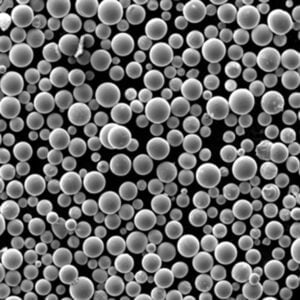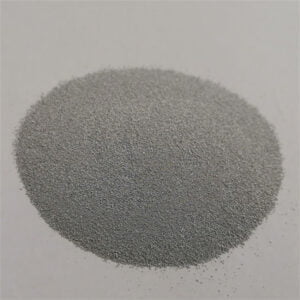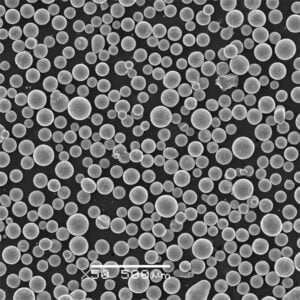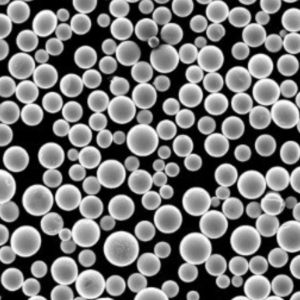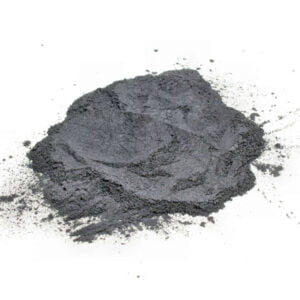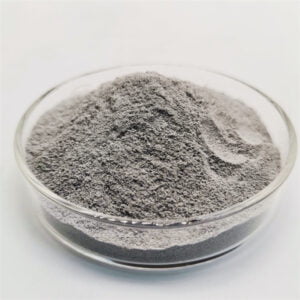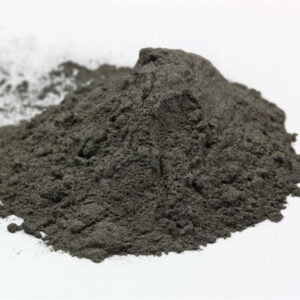구형 티타늄 분말 소개
목차
구형 티타늄 분말 입자 크기가 제어된 티타늄은 적층 제조 또는 분말 야금 프레스를 사용하여 강하고 가벼운 티타늄 금속 부품을 제조할 수 있습니다. 티타늄은 높은 중량 대비 강도, 내식성 및 생체 적합성으로 인해 항공우주, 의료, 자동차 및 기타 까다로운 응용 분야에서 매력적인 엔지니어링 소재입니다.
이 가이드에서는 금속 적층 가공 또는 프레스 및 소결 제조용 구형 티타늄 분말의 구성, 생산 방법, 사양, 용도, 가격 및 소싱 고려 사항을 다룹니다.
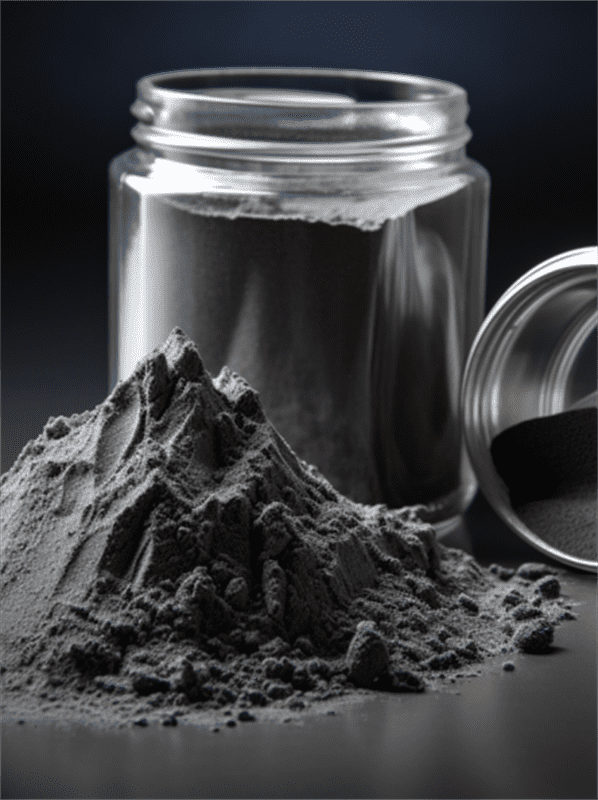
유형 구형 티타늄 분말의
구성 및 가공에 따라 구형 티타늄 분말은 다음과 같이 분류됩니다:
| 유형 | 설명 |
|---|---|
| CP(상업적으로 순수한) 티타늄 | 간질 원소 불순물이 적은 99.5% 이상의 순수 티타늄 |
| Ti-6Al-4V | 6% 알루미늄과 4% 바나듐이 추가된 티타늄 합금으로 강도를 높였습니다. |
| 사전 합금 분말 | 균일한 Ti-6-4 성분의 고체 구형 입자 |
| 혼합 원소 | 순수 티타늄, 알루미늄 및 바나듐 분말의 혼합물 |
완성된 티타늄 부품 애플리케이션의 기계적 특성, 내식성 및 예산 요구 사항에 맞게 등급을 조정합니다.
생산 방법
- 플라즈마 원자화 - 고에너지 플라즈마 토치가 공급 원료를 녹입니다. 강력한 인덕션 코일은 티타늄 스페로이드 형태로 응고되는 액적 스프레이를 생성합니다. 입자 분포가 가장 좁고 파우더 흐름과 포장 밀도가 우수합니다.
- 가스 분무 - 플라즈마 에너지 대신 가압 불활성 가스 제트를 사용하여 용융 티타늄 스트림을 미세한 물방울로 분무하는 유사한 공정입니다. 저전력 공정이지만 입자 크기가 더 넓습니다.
- 회전 전극 공정 - 회전하는 전극의 원심력이 용융된 티타늄을 물방울로 분해합니다. 작은 입자 크기를 달성합니다. 좁은 분포로 고속 생산.
온도, 압력 및 가스 흐름과 같은 공정 파라미터를 제어하면 티타늄 금속 제조에 선호되는 구형의 비다공성 분말을 얻을 수 있습니다.
구성 의 구형 티타늄 분말
| 등급 | 티타늄(Ti) | 알루미늄(Al) | 바나듐(V) | 철(Fe) | 산소(O) |
|---|---|---|---|---|---|
| CP 1등급 | 98.9% 분 | 최대 0.3% | 최대 0.2% | 최대 0.3% | 최대 0.18% |
| CP 등급 2 | 98.6% 분 | 최대 0.3% | 최대 0.1% | 최대 0.3% | 최대 0.25% |
| CP 등급 4 | 97.5% 분 | 최대 0.3% | 최대 0.1% | 최대 0.5% | 최대 0.40% |
| Ti-6Al-4V | 기본 | 5.5-6.75% | 3.5-4.5% | 최대 0.3% | 최대 0.13% |
탄소, 철, 크롬 제한을 통해 저산소 및 질소를 엄격하게 제어하여 내식성과 연성을 유지합니다. 다양한 용도에 따라 필요한 특성과 합금 비용의 균형을 맞출 수 있는 등급을 선택할 수 있습니다.
일반 사양
| 매개변수 | 가치 | 테스트 방법 |
|---|---|---|
| 순도 | >99% 티타늄 | ASTM E2371, ICP 분석 |
| 파티클 모양 | 구형 >92% | 현미경 |
| 탭 밀도 | 2.7-3.7g/cc | 홀 유량계 |
| 입자 크기 | 15-45 μm | 레이저 회절 |
| 산소(O) | <2000 ppm | 불활성 가스 융합 |
| 질소(N) | <400 ppm | 불활성 가스 융합 |
| 수소(H) | <150 ppm | 불활성 가스 융합 |
| 유량 | 50μm의 경우 >95% | 홀 유량계 |
구매 전에 공급업체의 통계적 배치 인증을 검토하여 표준 등급 요건과 이러한 지표 전반의 일관성 있는 성과를 확인합니다.
기계적 특성
| 합금 | 최대 인장 강도(ksi) | 항복 강도(ksi) | 연신율(%) |
|---|---|---|---|
| CP 1등급 | 130 | 120 | 20% |
| CP 등급 2 | 150 | 140 | 18% |
| Ti-6Al-4V | 160 | 150 | 10% |
목표 재료 강도를 달성하려면 열간 등방성 프레스 및 열처리와 같은 최적화된 열 후처리가 필요합니다. 필요한 속성에 맞게 등급을 조정합니다.
금속 3D 프린팅 애플리케이션
구형 티타늄 분말을 사용하는 주요 금속 첨가제 부품:
- 항공우주: 기체 브래킷, 윙 리브, 엔진 마운트 - 고강도, 저중량
- 의료 및 치과: 고관절, 무릎 및 척추 임플란트, 수술 도구 - 생체 적합성
- 자동차: 커넥팅 로드, 터보차저 부품 - 내열성 및 내식성
- 소비자: 안경 프레임, 스포츠 장비, 시계 본체 - 미적 품질
- 산업: 밸브, 펌프와 같은 유체 취급 부품, 선박용 하드웨어, 열교환기 등
산업 전반의 까다로운 생산 환경을 위해 높은 비강도와 Ti6-4와 같은 맞춤형 합금을 활용하세요.
산업 사양
- ASTM F1580 - 수술용 임플란트용 단조 티타늄 6-알루미늄 4-바나듐 합금
- ASTM B348 - 티타늄 및 티타늄 합금 바, 와이어, 분말 및 단조 스톡 사양
- AMS 4999 - 티타늄 합금 분말 생산에 대한 조성 제한 사항
- ISO 23304 - 적층 제조 공정에 사용되는 금속 분말
통계적으로 검증된 배치 인증서를 검토하여 파우더 로트 품질이 인증을 충족하는지 확인합니다.
품질 고려 사항
| 메트릭 | 허용됨 | 테스트 방법 |
|---|---|---|
| 탭 밀도 | ≥2.7g/cc | 홀 유량계 |
| 유량 요금 | 45μm 체의 경우 ≥95% | 홀 유량계 |
| 파티클 모양 | ≥92% 구형 | 현미경 |
| 입자 크기 분포 | ASTM B348 기준 | 레이저 회절 |
| 주요 전면 광고(O, H, N) | <2000; <150; <400 ppm 각각. | 불활성 가스 융합 |
파우더 품질 특성은 최종 소결 부품 소재의 강도, 표면 마감 및 결함률과 직접적인 상관관계가 있습니다.
가격 범위
| 등급 | 입자 크기 | kg당 가격 |
|---|---|---|
| CP 1등급 | 15-45 미크론 | $50-$150 |
| Ti-6Al-4V | 15-45 미크론 | $55-$200 |
| Ti-6Al-4V ELI | 10-75 미크론 | $250-$750 |
가격은 순도, 분말 크기, 생산량 및 지역적 요인에 따라 달라집니다. 애플리케이션에 맞는 최종 후보 공급업체로부터 확실한 예산 견적을 받아보세요.
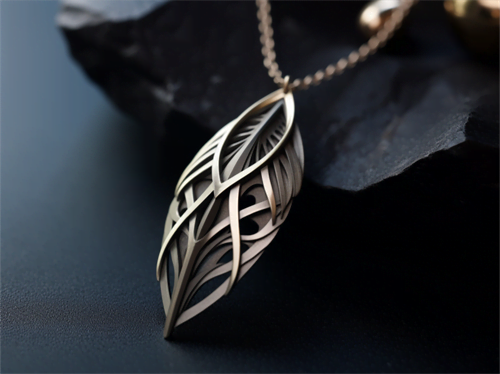
구매 고려 사항
| 매개변수 | 중요성 |
|---|---|
| 품질 인증 | 높음 |
| 일관성 | 높음 |
| 부품 인증 데이터 | Medium |
| 기술 지원 | Medium |
| 샘플링 가용성 | 낮음 |
| 가격 요소 | 낮음 |
자주 묻는 질문
Q: 티타늄 파우더의 고결이란 무엇이며 어떻게 방지할 수 있나요?
A: 분말 입자가 서로 뭉쳐서 부분적으로 소결된 덩어리가 되는 것을 케이킹이라고 합니다. 이는 흐름과 포장 밀도를 방해합니다. 시간이 지남에 따라 티타늄 입자 사이에 고결이 생기는 수분 및 산소 흡수 부반응을 방지하기 위해 건조제와 함께 밀폐 용기에 보관하십시오.
질문: 티타늄 파우더와 관련된 건강상의 위험이 있나요?
A: 대부분의 미세 금속 분말과 마찬가지로 취급 시 흡입하지 않도록 주의하세요. 민감성 문제를 제외하면 티타늄 분말은 비교적 불활성이며 무독성으로 간주되어 외부 접촉이나 섭취 사고의 위험이 낮습니다. 보관, 운송 또는 처리 시 적절한 보호 장비와 절차를 사용하세요.
Q: 티타늄 파우더를 올바르게 보관하는 방법은 무엇인가요?
A: 산화를 방지하기 위해 디시전 백으로 용기를 밀폐하세요. 온도 변화를 10~30°C로 제한하세요. 색상이 반짝이는 회색으로 변하면 수소 취화 등 변질을 의미하므로 폐기하세요. 적절히 보관하면 유통기한은 5년 이상입니다.
질문: 티타늄 파우더는 특별한 배송 및 취급이 필요한가요?
A: 위험하지 않은 불연성 물질로 분류됩니다. 너무 덥거나 추울 때는 운송을 피하세요. 누출이나 오염을 방지하기 위해 포장을 단단히 고정하세요. 고순도 연구용은 젤 팩이 포함된 특수 저온 배송기를 사용할 수 있습니다.
공유
중국 칭다오에 본사를 둔 선도적인 적층 제조 솔루션 제공업체인 MET3DP Technology Co. 당사는 산업용 3D 프린팅 장비와 고성능 금속 분말을 전문으로 합니다.
관련 기사
Met3DP 소개
최근 업데이트
제품

3D 프린팅 및 적층 제조용 금속 분말
문의 정보
- 칭다오시, 산둥성, 중국
- [email protected]
- [email protected]
- +86 19116340731






